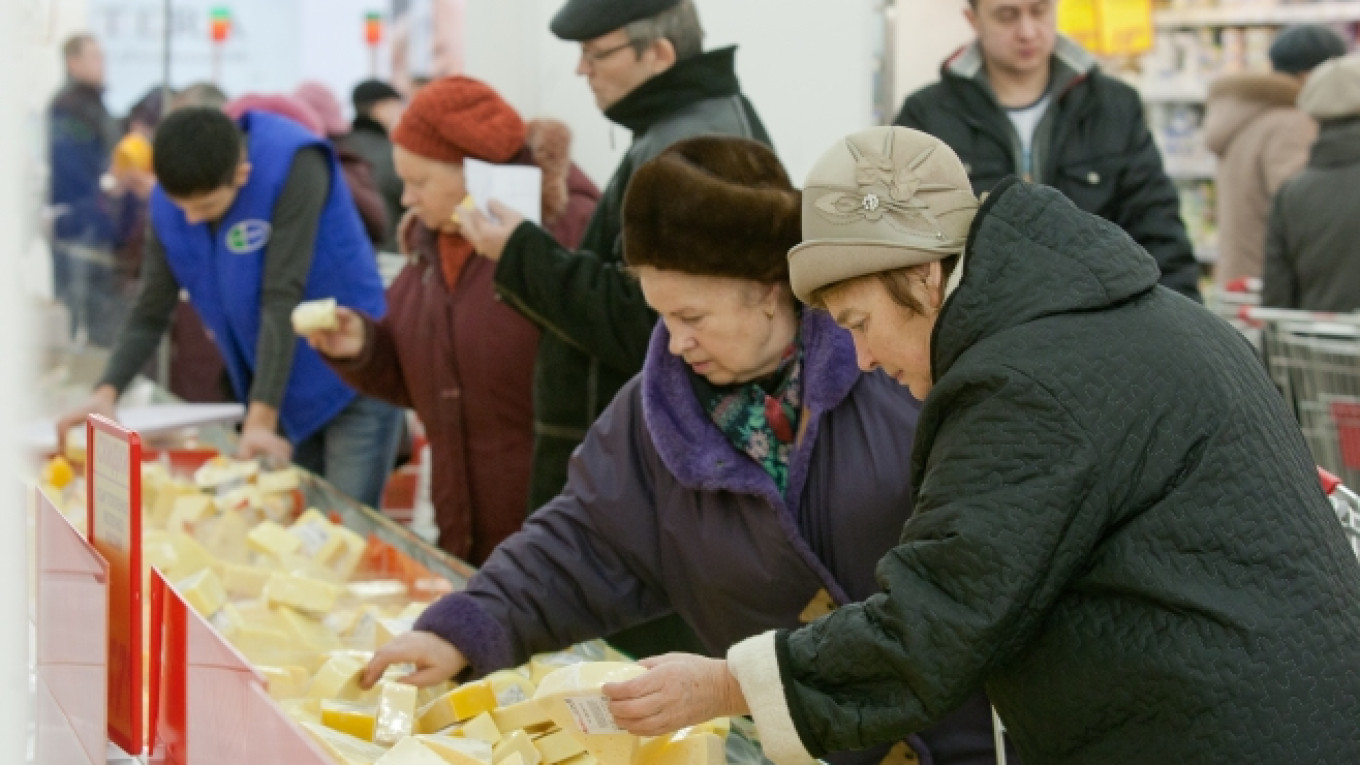The value of goods imported by Russia from outside the former Soviet Union tumbled 39 percent in the first eight months of this year compared to the same period in 2014, as a deep recession cut into the country's buying power.
According to preliminary data from the Federal Customs Service released this week, Russia imported goods worth $103.9 billion over the period, down from $170.3 billion in January-August last year.
The decline comes as the low price of oil, Russia's key export, shrinks the country's income and worsens an economic slowdown. Russia's ruble has weakened by around 45 percent against the dollar during the last year, making imports more expensive for companies and consumers.
A breakdown of the figures for August shows that the value of machinery and equipment imports dropped 36.7 percent compared to the same month in 2014. Imports of chemicals plunged by 29.4 percent, and of textiles and shoes by 35.9 percent, the data showed.
Food imports, whose value fell by 29.1 percent, were also constricted by embargoes imposed by the Kremlin in August 2014 on meat, fish, dairy, fruit and vegetables from the U.S. and European Union and some other allied countries — a retaliation to sanctions on Russia over its actions in Ukraine. The government in August doubled down on these measures by burning contraband food and crushing it with tractors at the border.
Vegetable oil, tobacco and cotton saw their import value grow slightly, along with pork — the latter likely due to smaller import volumes last year when sanitary controls blocked imports from a number of countries.
Overall in August, Russia imported goods from beyond the former U.S.S.R. worth $13.5 billion, 1.7 percent less than in July.
Not all countries suffered equal losses in sales to Russia. Customs data from January-July showed that the European Union — Russia's biggest trading partner — saw the largest drop-off in exports to Russia, with the value of its deliveries falling 45 percent compared to the same period a year before.
The Netherlands, Britain and France — in the top five European exporters to Russia — saw sales to the country cut in half. Germany and Italy saw exports fall around 40 percent, while former Soviet republics Estonia and Lithuania suffered falls of 57.1 percent and 55.5 percent, respectively.
Russian imports from the U.S. and Japan fell by just over 40 percent, while those from China — with which Russia is trying to boost trade — declined by 34.1 percent.
Russian exports have fallen at a slightly slower pace than imports. No data for August has been published, but in January-July, total exports — including to former Soviet republics — fell 30.6 percent to $210.5 billion, leaving a trade surplus of more than $100 billion.
During that period the volume of oil and gas exports to countries outside the former Soviet Union actually rose 6.1 percent, but due to the lower oil price the value of those deliveries plunged by 36.6 percent compared to the same period in 2014, when oil cost more than $100 per barrel.
The Russian government has during the past year accelerated programs to replace imports with locally produced goods, but the plans have been hampered by high interest rates and a shortage of capital to invest in new facilities.
Contact the author at p.hobson@imedia.ru
A Message from The Moscow Times:
Dear readers,
We are facing unprecedented challenges. Russia's Prosecutor General's Office has designated The Moscow Times as an "undesirable" organization, criminalizing our work and putting our staff at risk of prosecution. This follows our earlier unjust labeling as a "foreign agent."
These actions are direct attempts to silence independent journalism in Russia. The authorities claim our work "discredits the decisions of the Russian leadership." We see things differently: we strive to provide accurate, unbiased reporting on Russia.
We, the journalists of The Moscow Times, refuse to be silenced. But to continue our work, we need your help.
Your support, no matter how small, makes a world of difference. If you can, please support us monthly starting from just $2. It's quick to set up, and every contribution makes a significant impact.
By supporting The Moscow Times, you're defending open, independent journalism in the face of repression. Thank you for standing with us.
Remind me later.


